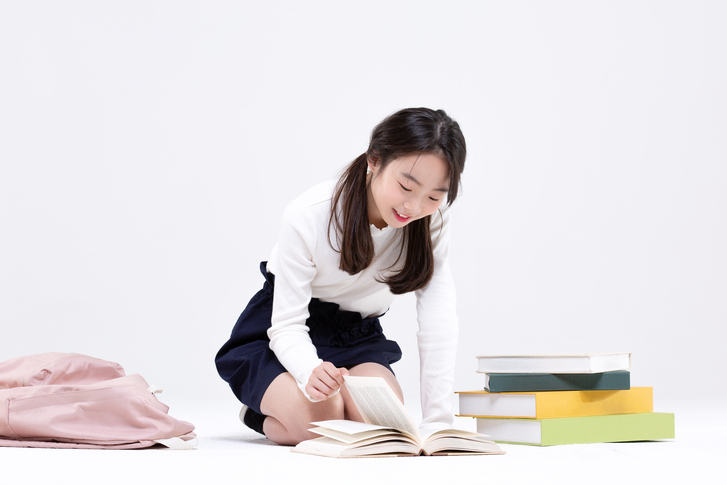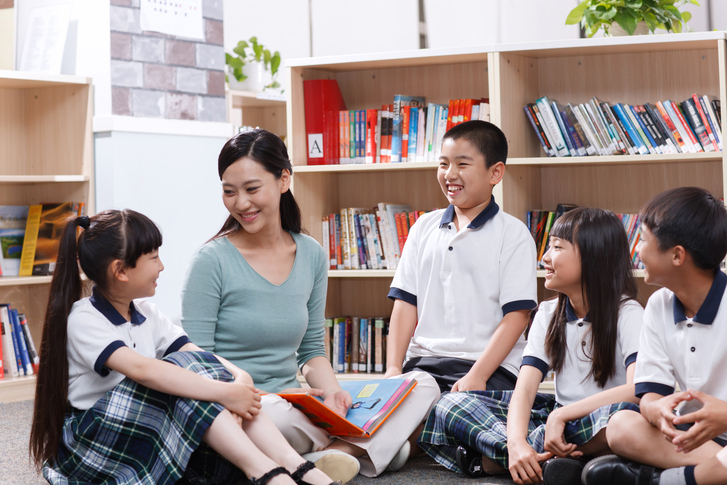 |
(Getty Images) |
How can you cultivate a lifelong love of reading in your child? Reading them a story before bed, sharing stories and regular library visits might come to mind.
In Korea, there’s another option that is popular with parents: sending your kids to private reading academies.
At a typical one, children read for a designated time, followed by activities such as writing summaries, studying vocabulary and engaging in discussions about the material with the teacher. For older students, the curriculum is more geared toward providing structured reading guidance to enhance reading comprehension and broaden their knowledge of the world.
In a Naver cafe for mothers of elementary school students, a user asked whether enrollment in "hagwon," a for-profit educational institute, could help her second-grade son develop a greater interest in reading.
All the comments expressed positive sentiments toward reading guidance programs. One of them read, “They (children) will develop a fondness for reading as they go along.”
Unfortunately, this enthusiasm for reading is not shared by many adults. According to government data, only 43 percent of Koreans over the age of 19 read at least one book last year, marking a record low. In contrast, 95.8 percent of elementary, middle and high school students reported reading, averaging 36 books per year, excluding comics, magazines and school-related materials.
While the rewards of reading are manifold, in the minds of these parents, the essence of private reading education often boils down to one key aspect: it's a strategic gateway to academic success here.
Hagwon: substitute for parenting
Despite variations in format and approach, reading programs offered by private academies share a common goal: enhancing children’s cognitive development through guided discussions and writing exercises centered on full-length books. While the costs of each academy vary, prices typically range from 150,000 to 200,000 won ($110 to $145) per month for attending one- to two-hour classes twice a week.
South Korea's parents are well-known for significantly investing in their children's private education.
According to 2023 data from Statistics Korea and the Education Ministry, private education expenditures in Korea surged to an all-time high of 27 trillion won total. The average monthly private education expenses per student saw a 5.5 percent on-year increase to 553,000 won.
Spending on “Korean language courses,” which encompasses various aspects of studying Korean language and literature, such as writing, reading and test preparation, rose the most, rising by 11.1 percent compared to the previous year.
A Seoul resident surnamed Lee currently sends her two children aged six and 12 to one of these academies. She views these institutes as a suitable substitute for spending time with her kids as a parent and helping them read, as well as them enjoying their own free time reading at home.
"I wanted my children to be exposed to a diverse selection of books that we don't have at home,” she said. “Moreover, my hectic life leaves me little room to spend quality time discussing these books with them."
Choi Na-ya, a child development professor at Seoul National University, told The Korea Herald that reading activities guided by parents or teachers can positively contribute to young children’s linguistic and cognitive development.
In her opinion, private reading academies are a viable option for parents who can’t assist their children with reading at home. "This is especially true for children who genuinely enjoy the curriculum offered at these institutes,” she said.
However, reading academies don’t always limit their role to instilling a joy for reading in children.
With older students, their programs tend to link reading with skills like essay composition and debate, often turning into preparation for college entrance exams. This approach aligns with that of many parents who view reading as a crucial building block for students to slog through higher-level academic courses later on.
An official from the Korean private educational institute Booktree, which offers book-based curricula for elementary and middle school students, said, “While personal growth through one-on-one reading tutoring sessions is our primary focus, it is also essential to incorporate programs designed to improve students’ academic performance to appeal to parents.”
A university student in Seoul in her 20s, Choi Jin-kyung, recalled having attended various reading academies since her elementary school years.
"In sixth grade, my reading academy was centered on debating, where we read books as homework and engaged in discussions. However, as I transitioned to middle and high school, essay writing took center stage, mostly to prepare for applying to prestigious universities."
 |
(Getty Images) |
English reading: fun or rat race?
Reading classes are even more widespread and intense in the for-profit English education industry.
According to the data above, of the vast sums spent on private education, English education made up the largest portion at 29.5 percent.
These English literature classes aim to create a print-rich environment that makes reading more enjoyable and accessible.
Some of these classes draw from the approach of University of Southern California professor emeritus of linguistics Stephen Krashen, an expert in second language acquisition who argues that reading -- instead of memorizing vocabulary and grammar -- is the best way to learn a second language, and that “comprehensible input” just slightly above a student's current proficiency level is key to second language mastery.
Now, reading academies in Korea assert that if an English immersive environment cannot be created at home or school, such comprehensive input can only be achieved through reading lots and lots of books.
Kim Yi-su, 31, an office worker in Seoul, reflected on his experience as a tutor at Read 101, a private English library that offers individualized reading instruction in English.
When questioned on whether he sees value in students reading English books, he said, "It's a captivating way to learn the language through engaging plots and illustrations."
At 12, Kwon, who previously attended an English kindergarten and is now studying at an English reading institute, credits these experiences with helping him adjust to reading in a second language. "I do well in English class at school and often read English books at home for fun," he said.
In exploring the factors driving the growth of English reading practices, Lee Byung-min, a professor of English language education at Seoul National University, looks at the limitations of the public school English curriculum.
“English education in public schools is grammar-oriented and mostly centers around short reading passages,” he said. “In this learning environment, a focus on memorization can lead to high test scores but may compromise the development of fundamental reading skills.”
"Students have limited opportunities to explore full-length books that allow for a deeper, long-term understanding of context in learning the second language," he added.
Notwithstanding the acknowledged value of reading, some people are wary over its link to the for-profit education industry.
Gu Bon-chang, director of the civic group A World Without Worry About Private Education, explained that pressuring young students to read may only deepen their aversion to reading.
Gu said that reading hagwon, despite their purported common goal to nurture book-loving children, are essentially similar to other after-school academies, the goal of which is to get students into top universities.
"Most reading academies adjust their programs to align with the shifting trends in college entrance exam education," he noted.
For one instance, the emergence of academies specializing in speed-reading techniques in the 2000s was related to the emphasis on rapid reading for taking exams, according to Gu. “Today, reading academies focus on short excerpts,” he added.
He said that these types of practices in private academies may also exacerbate educational inequality, as it is inevitable that “access to English literature is closely tied to students' family background and financial resources.”
In line with this perspective, professor Choi argues that attending hagwon for reading should not be seen as a necessity.
Parents should recognize that their active involvement is usually sufficient to support their children enjoying reading at home, she said, and that it would be better to correct "the culture that only associates reading with studying" in Korean society.







![[Herald Interview] How Gopizza got big in India](http://res.heraldm.com/phpwas/restmb_idxmake.php?idx=644&simg=/content/image/2024/11/20/20241120050057_0.jpg)